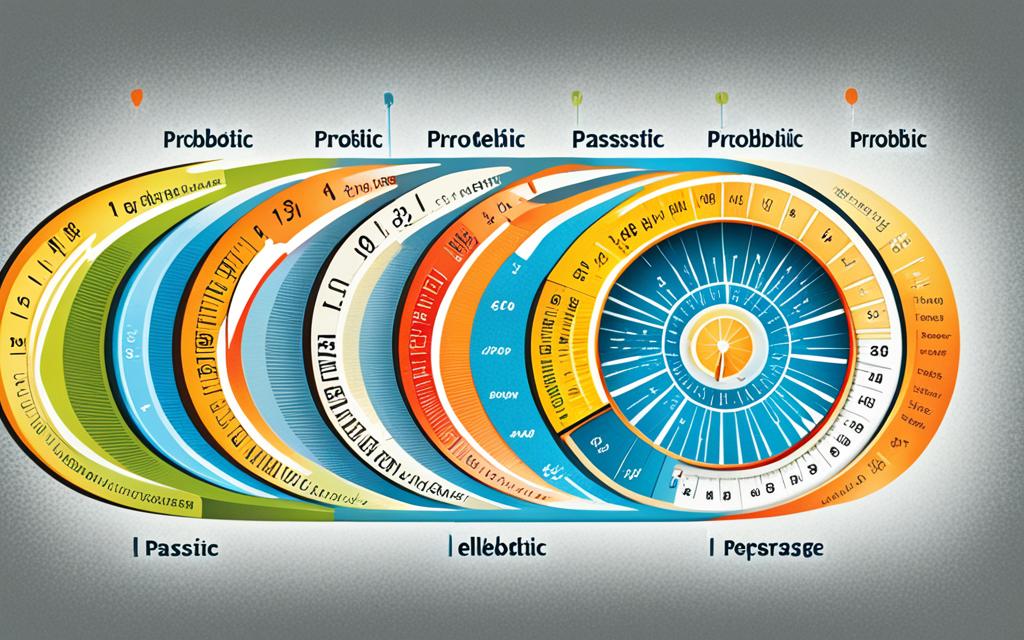Probiotic to Help with Bloating: Relieve Discomfort
Feeling bloated can really ruin your day. If you’re fed up with that swollen feeling in your belly, probiotics might be what you need. These tiny helpers can greatly improve your gut health and ease digestive issues. By adding probiotics to your daily routine, you’re taking a big step towards better digestive comfort and overall well-being.
Probiotics are live bacteria that support your digestive system. They help balance the good and bad bacteria in your gut. This can reduce bloating and other tummy troubles. When your gut is happy, you’re more likely to feel comfortable and full of energy all day.
Key Takeaways
- Probiotics can help alleviate bloating and digestive discomfort
- They work by balancing gut bacteria
- Adding probiotics to your routine may improve overall well-being
- Probiotics come in supplement form or from fermented foods
- Consistent use of probiotics can lead to better digestive health
Understanding Bloating and Its Causes
Bloating is a common issue that makes you feel full or tight in your stomach. To handle bloating, knowing its causes and how gut health affects it is key.
Common Triggers of Bloating
Some foods and habits can cause bloating. These include:
- Eating too quickly
- Consuming carbonated drinks
- Overeating
- Consuming foods high in fiber or fat
- Swallowing air while eating or drinking
Finding out what triggers bloating for you can help you deal with it better.
The Role of Gut Bacteria in Digestive Health
Your gut has trillions of bacteria that are crucial for your digestive health. When these bacteria are not in balance, it can cause bloating. Keeping your gut microbiome healthy is important for avoiding and managing bloating.
How Probiotics Can Help Alleviate Bloating
Probiotics are good bacteria that can fix an unbalanced gut microbiome. They help by improving digestion and reducing bloating. Probiotics do this by:
- Enhancing the breakdown of food
- Reducing gas production
- Improving gut motility
Eating foods high in probiotics or taking supplements can help ease bloating and support gut health.
What Are Probiotics and How Do They Work?
Probiotics are live microorganisms that are good for your health when eaten in the right amounts. They help keep your gut healthy and support your overall health. You can find them in some foods or as supplements.
When you add probiotics to your diet, they make themselves at home in your gut. They work with the bacteria already there. This mix creates a healthy balance in your gut, which is key for digestion and fighting off sickness.
Probiotics help break down food and turn it into nutrients your body can use. They also make vitamins that your body needs.
Probiotics are great for gut health because they make the lining of your intestines stronger. This lining keeps bad stuff from getting into your blood and lets good stuff through. This helps reduce inflammation and can ease digestive problems like bloating.
“Probiotics are nature’s way of balancing our gut ecosystem, promoting digestive harmony and overall wellness.”
Probiotics also fight off bad bacteria in your gut. By winning this battle, they keep your gut balanced and stop bad bacteria from taking over. This can lead to less gas, better bowel movements, and less bloating.
Knowing how probiotics work helps you use them to improve your digestion. Adding foods or supplements with probiotics to your diet can help keep your gut balanced. This might also help with bloating.
Probiotic to Help with Bloating: Choosing the Right Strains
Choosing the right probiotic strains can greatly help with bloating. Let’s look at some good options to help you pick the best one.
Lactobacillus and Bifidobacterium Strains
Lactobacillus and Bifidobacterium are key probiotic strains for digestion. Lactobacillus acidophilus and Bifidobacterium lactis are great for easing bloating and gas. They help break down food, absorb nutrients, and keep the gut balanced.
Saccharomyces Boulardii: A Yeast Probiotic
Saccharomyces boulardii is a yeast probiotic that fights bloating well. It supports digestive health by lowering inflammation and improving gut function. It’s especially good at easing diarrhea-related bloating and discomfort.
Multi-Strain Probiotic Formulations
Multi-strain probiotics offer a broad approach to easing bloating. They mix different beneficial bacteria to tackle various digestive health issues. This mix creates a powerful effect that boosts gut function and reduces bloating.
When picking a probiotic for bloating, look for ones with these strains. Remember, everyone’s body reacts differently to probiotics. You might need to try a few to find the best one for you.
Top Probiotic Supplements for Bloating Relief
Finding the right probiotic supplements can change your digestive health for the better. Let’s look at some top choices that help ease bloating.
Align Probiotic is a favorite, with Bifidobacterium 35624 to support digestive balance. People see less bloating in a few weeks with daily use. You should take one capsule a day.
Culturelle Digestive Health Probiotic has Lactobacillus rhamnosus GG, great for gut health. It cuts down on gas and bloating and helps with regular bowel movements. For best results, take one capsule every day.
Renew Life Ultimate Flora Extra Care Probiotic has 50 billion live cultures from 12 strains. This mix helps with bloating and other digestive problems. Take one capsule a day, with or without food.
| Probiotic Supplement | Key Strain | CFU Count | Dosage |
|---|---|---|---|
| Align Probiotic | Bifidobacterium 35624 | 1 billion | 1 capsule daily |
| Culturelle Digestive Health | Lactobacillus rhamnosus GG | 10 billion | 1 capsule daily |
| Renew Life Ultimate Flora | Multi-strain blend | 50 billion | 1 capsule daily |
Remember, everyone is different. It may take time to see how probiotic supplements work for you. Always talk to a healthcare professional if you have ongoing digestive issues.
Natural Sources of Probiotics for Gut Health
Boosting your gut health with natural probiotics is easier than you might think. Many foods and drinks are rich in these beneficial bacteria. They offer a tasty way to support your digestive system.
Fermented Foods Rich in Probiotics
Fermented foods are full of natural probiotics. Yogurt, kefir, sauerkraut, and kimchi are great for gut health. They have live cultures that improve your gut.
Probiotic-Enhanced Beverages
Drinks can be a great source of probiotics too. Kombucha, a fermented tea, is popular for its probiotic content. Some juices and smoothies are also fortified with probiotics. This makes them a refreshing way to support your digestive system.
Incorporating Probiotic Foods into Your Diet
Adding probiotic-rich foods to your meals is easy. Try a yogurt parfait for breakfast, kombucha with lunch, or kimchi with dinner. Remember, eating these foods regularly is key to getting the most benefits for your gut health.
| Food | Probiotic Strains | Serving Suggestion |
|---|---|---|
| Yogurt | Lactobacillus, Bifidobacterium | 1 cup daily |
| Kefir | Multiple strains | 1 cup daily |
| Sauerkraut | Lactobacillus | 1/4 cup as a side dish |
| Kombucha | Acetobacter, Saccharomyces | 4-8 oz daily |
Lifestyle Changes to Complement Probiotic Use
Taking probiotics is a great step toward improving your gut health. But, adding lifestyle changes can make them even more effective. Let’s look at some easy yet effective ways to boost your digestive health.
Eating right is key for your gut. Add foods high in fiber like fruits, veggies, and whole grains to your meals. These foods feed the good bacteria in your gut. Try to cut down on processed foods and sugar, as they can upset your gut balance.
Exercise is also important. It helps with digestion and keeps your bowel movements regular. Try to get at least 30 minutes of moderate exercise every day.
Don’t forget about stress management. It’s crucial for your gut health. Use techniques like deep breathing, meditation, or yoga to reduce stress and its effects on your digestion.
Drinking enough water is also crucial. It helps with digestion and prevents constipation. Make sure to drink water throughout the day.
Lastly, getting enough sleep is important. Good sleep is key for your overall health, including your digestive system.
| Lifestyle Change | Benefit for Gut Health |
|---|---|
| Fiber-rich diet | Nourishes good gut bacteria |
| Regular exercise | Stimulates digestion |
| Stress management | Reduces digestive issues |
| Proper hydration | Supports healthy digestion |
| Consistent sleep | Promotes overall gut health |
By making these lifestyle changes and using probiotics, you’re on your way to better gut health and digestive comfort.
Potential Side Effects and Precautions of Probiotic Use
Probiotics have many benefits, but it’s important to know about possible side effects and digestive issues. This knowledge helps you make smart choices about using probiotics.
Common Side Effects When Starting Probiotics
Starting probiotics might cause some digestive problems at first. You might feel bloated, have gas, or experience mild stomach discomfort. These symptoms usually go away as your body gets used to the new bacteria.
Who Should Avoid Probiotics?
Some people should be careful or avoid probiotics:
- People with weakened immune systems
- Those with severe health conditions
- Individuals allergic to probiotic ingredients
Consulting with a Healthcare Professional
Before starting probiotics, talk to your healthcare provider. They can check if probiotics are right for you and what risks you might face. This ensures probiotics are safe and good for you.
| Probiotic Side Effect | Duration | Severity |
|---|---|---|
| Bloating | 1-2 weeks | Mild to moderate |
| Gas | 1-2 weeks | Mild |
| Stomach discomfort | 1-3 days | Mild |
Knowing about possible side effects and digestive issues helps you make smart choices about probiotics. Most side effects are short-lived and will lessen as your body adjusts to the probiotics.
How Long Does It Take for Probiotics to Work on Bloating?
Probiotics can help with bloating, but how fast they work varies. Some people see changes in a few days, while others might take weeks. This depends on your gut health, diet, and the probiotic type.

Being consistent with probiotics is important for relief from bloating. Stick to a regular schedule and let your body adjust. Most people start to feel better in 2-4 weeks of regular use. Remember, probiotics balance your gut microbiome, which takes time.
“Probiotics can be a game-changer for bloating, but patience is crucial. Give them time to work their magic on your gut health.”
Here are tips to make probiotics more effective:
- Take probiotics on an empty stomach
- Choose a high-quality supplement with proven strains
- Maintain a healthy diet rich in fiber
- Stay hydrated to support digestion
Keep an eye on your symptoms to see if you’re getting better. If you don’t feel better after 4-6 weeks, talk to your healthcare provider. They might suggest changing your probiotic or recommend other options for bloating relief.
| Time Frame | Expected Results |
|---|---|
| 1-3 days | Minor changes in digestion |
| 1-2 weeks | Noticeable reduction in bloating |
| 2-4 weeks | Significant improvement in symptoms |
| 4-6 weeks | Optimal bloating relief and gut balance |
Conclusion
Probiotics are a great way to help with bloating and improve gut health. They add good bacteria to your gut, helping to balance things out. This can ease symptoms and make you feel better.
But remember, everyone is different, so results can vary. It’s important to pick high-quality supplements or eat foods rich in probiotics regularly. Listen to how your body reacts and be patient, as probiotics can take time to work.
If you’re dealing with ongoing bloating, think about adding probiotics to your daily life. With the right approach and some time, these tiny helpers could be a big step towards a healthier gut. Always talk to a doctor before starting any new supplements to make sure they’re right for you.
FAQ
What are probiotics, and how can they help with bloating?
Probiotics are live bacteria and yeasts that help keep your gut healthy. They can ease bloating by improving digestion, cutting down gas, and boosting gut health.
What are the common triggers of bloating?
Foods that make gas, swallowing air, and digestive issues like IBS can cause bloating. An imbalance in gut bacteria also plays a role.
How do probiotics function in the digestive system?
Probiotics help by balancing good and bad gut bacteria. They aid digestion and reduce inflammation. This can ease bloating and other digestive problems.
What are some effective probiotic strains for bloating relief?
Strains like Lactobacillus, Bifidobacterium, and Saccharomyces boulardii help reduce bloating. Using a mix of these strains can also be beneficial for gut health.
Can you recommend any top probiotic supplements for bloating relief?
For bloating relief, consider [Insert Brand Names and Product Details]. Always talk to your healthcare provider before starting any new supplements.
Are there any natural sources of probiotics?
Yes, foods like yogurt, kefir, sauerkraut, and kimchi are great for probiotics. You can also try probiotic-enhanced drinks and foods for better gut health.
What lifestyle changes can enhance the effectiveness of probiotics?
Eating more fiber, drinking plenty of water, managing stress, and exercising can help probiotics work better. These changes can improve your digestion and reduce bloating.
Are there any potential side effects of taking probiotics?
Probiotics are usually safe but might cause mild side effects like gas or bloating at first. If you have a weak immune system or certain health conditions, talk to your doctor before taking them.
How long does it take for probiotics to work on bloating?
You might start feeling better in 2-4 weeks with regular probiotic use. But, it could take longer for some people. This depends on your gut health and the type of probiotics you take.







